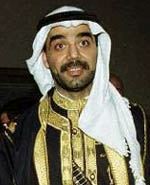 |
| Vol. 3 No. 2 | Table of Contents MEIB Main Page | February 2001 |
Syria lifts travel restrictions to Iraq
5 January 2001
Al-Sharq Al-Awsat (London) reports that Damascus has decided to lift restrictions on the travel of Syrian citizens to Iraq. Previously, all Syrian passports carried an endorsement stating "not valid for Iraq." The paper interprets the new move as one more step in the growing détente between Baghdad and Damascus. Previously, Baghdad had opened an Interests Section and an Iraqi Trade Center in the Syrian capital, along with an Iraqi Airways office. Also, a passenger train service between Mosul and Aleppo has recently been initiated.
 |
| Uday Hussein |
New Turkish ambassador in Baghdad
14 January 2001
Milliyet (Istanbul) interviewed Turkish Foreign Minister Ismail Cem, asking whether a Turkish ambassador would soon be named to Iraq, as was widely rumored. Cem replied by noting that it was natural for Turkey to develop economic and political ties with Iraq, after the severe losses it sustained during the Gulf War. Cem added that ten years had passed since the war and that even American businessmen regularly shuttle between Amman and Baghdad. Four days later Iraqi Foreign Minister Muhammad Al-Sahhaf received the credentials of the new Turkish ambassador, Mehmet Akad.
UN agrees to open Iraqi-Saudi border for trade
20 January 2001
Al-Sharq Al-Awsat (London) reports that the United Nations Sanctions Committee has agreed to open a crossing on the Iraqi-Saudi border for trade to be conducted under the terms of the U.N. Security Council Resolutions providing for U.N.-supervised trade with Baghdad. The crossing is to be at Arar. U.N.-appointed inspectors are to supervise each side's adherence to the U.N. resolutions. The Saudi request to open a commercial crossing was originally submitted in October 2000, but the implementation of the request was delayed until the U.N. Secretary General could appoint the necessary inspectors.
Iraqi-Syrian military coordination reported
23 January 2001
Ha'aretz (Tel Aviv) reports that Iraq's recent concentration of troops near the Syrian border was the result of an agreement reached between Iraqi President Saddam Hussein and Syrian President Bashar Assad. Ha'aretz advises that the movement of Iraqi troops should be seen as a strategic signal to Israel, preparing the ground for possible Iraqi military involvement in a future conflict. For Saddam, the movement of Iraqi troops was a way of flexing Baghdad's muscle and encouraging the Palestinian intifadah. For Bashar, it was a way of countering the Israeli threat to Syria, particularly as senior Israeli figures had begun to declare that if Hezbollah carried out further provocations, Jerusalem would respond very harshly.
Iranian intelligence reports operations by Mojahedin-e Khalq
28 January 2001
IRNA (Teheran) carries a report from the Iranian intelligence ministry claiming that the Iraqi-based Iranian rebel group Mojahedin-e Khalq has launched 25 "terrorist schemes" in Teheran and several Iranian cities bordering Iraq so far this month. It said that a number of guerrillas had been killed and 10 arrested in Teheran since January 8. Three mortar-launchers, 42 mortar shells, 15 grenades, five assault rifles and over 15 forged ID cards were seized.
Earlier this month, Iranian Intelligence Minister Ali Yunesi said that the Mojahedin-e Khalq was gradually weakening and "getting closer to their dying day."
Opposition attacks against regime
30 January 2001
Al-Hayat (London) reports several incidents of unrest in Iraq. An unknown rebel group opened fire on Adil Abdallah Mahdi, a member of the Regional Command of the Ba'ath Party, in charge of the party's organizations in Ba'qubah Governate in early January. Mahdi was slightly wounded and one of his body guards was killed.
There were also incidents in the Iraqi capital. Military intelligence headquarters in Al-Kazimiyah area in Baghdad was hit with mortar shells and a senior officer in the presidential office was killed opposite his home in Al-Ghazaliyah area in Baghdad.